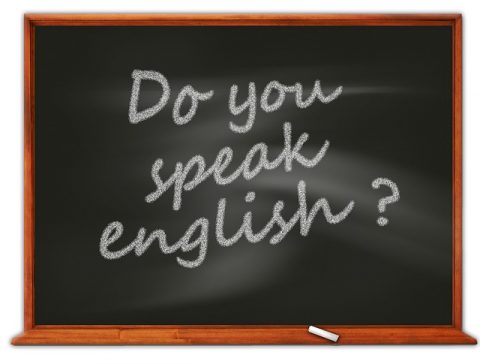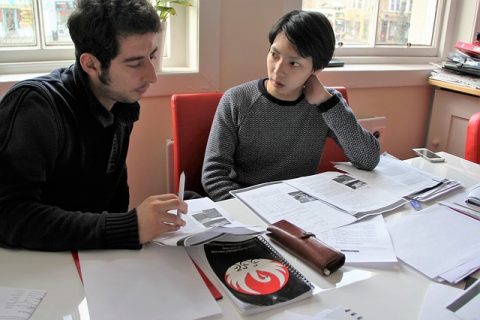 When I arrived in Australia as a new migrant in 2007, my English was ‘pretty good’. Well, I suppose it should have been, I had moved here directly from England, a country I had lived in since birth.
When I arrived in Australia as a new migrant in 2007, my English was ‘pretty good’. Well, I suppose it should have been, I had moved here directly from England, a country I had lived in since birth.
Migrants arriving in Australia though come from all over the world. Whilst the main applicant on some visa types needs to prove a certain level of proficiency in the English language in order to lodge a successful application, not all do. Also, some of the immediate family and dependents of those main applicants can often arrive here without good English language skills.
Last time I looked, which was for 2015/16, India topped the list of source countries for migrants coming to Australia. China, Philippines, Pakistan, Vietnam, Nepal and Malaysia all made the top 10. None of these are English-speaking countries and therefore, as you can imagine, many people arriving here do not have a good command of the English language like what I do.
To embrace this country fully, to integrate with those around you, to enjoy your life in Australia to the max, speaking English is a priority. As AMEP say ‘Better English. Better life.’ But what is AMEP?
Adult Migrant English Program
AMEP is an Australian Government Department of Education and Training funded program that will help qualifying participants to learn English for free to help them settle confidently into life in Australia.
 There are so many advantages to learning or improving your English:
There are so many advantages to learning or improving your English:
- Make new friends
- Improve your chances of getting a job
- Integrate more easily into Australian life
- Order food in a restaurant without pointing at the pictures in the menu
Well, I’m sure you can think of many other advantages, but I suspect what you really want to know is how you can take advantage of this free service yourself.
Study English for free
 The Adult Migrant English Program (AMEP) provides up to 510 hours of English language tuition to eligible migrants and humanitarian entrants. The program helps students learn foundation English language and settlement skills to enable them to participate socially and economically in Australian society.
The Adult Migrant English Program (AMEP) provides up to 510 hours of English language tuition to eligible migrants and humanitarian entrants. The program helps students learn foundation English language and settlement skills to enable them to participate socially and economically in Australian society.
Eligibility conditions apply; eligible new migrants must register for the program within six months of their visa being issued, so it’s important to do this as soon as possible after arriving in Australia.
Study locations
Coverage is nationwide, please choose the closest location to where you will be or are living to find out the full details of how this will work.
Queensland
TAFE Queensland: https://amep.tafeqld.edu.au/
New South Wales
AMES: https://ames.edu.au/amep/what-is-the-amep/
Navitas: http://navitasenglish.com/amep.html
Victoria
Melbourne Polytechnic on behalf of Northern AMEP Consortium: http://www.northernamep.com.au/
Tasmania
TASTAFE: http://www.tastafe.tas.edu.au/future/english-language-services/
ACT
Navitas: http://navitasenglish.com/amep.html
Western Australia
North Metropolitan TAFE: https://central.wa.edu.au/amep/Pages/default.aspx
South Metropolitan TAFE: http://www.polytechnic.wa.edu.au/content/amep
Northern Territory
Charles Darwin University: http://www.cdu.edu.au/cdu-vet/business-improvement/amep
South Australia
TAFE South Australia: http://www.els.sa.edu.au/
Service providers
Finally, here is a list of all the service providers and their locations across Australia:
I think this is a fantastic initiative, and I would like to thank Jackie McRae, Marketing and Communications Officer of TAFE Queensland English Language and Literacy Services, for bringing this to my attention.
I can tell you, if I didn’t already speak better proper English myself, I’d be having a go at this straightaway.
Here’s what others have to say about this program:
“I was a waiter for a couple of years in a fine dining restaurant. When I moved here from the Philippines, I was told about the English course through the Adult Migrant English Program and my teacher said there was a Certificate III in Commercial Cookery course I could do. The AMEP created a good pathway to where I am working now. I am thankful to the program.”
Jeszare Anteza, Rockhampton
“The AMEP has helped me a lot. I have met amazing teachers who have been able to help me in so many ways in terms of my career and understanding how to live in Australia. They have been like family and that has been very special.”
Kagyu Kowa, Ipswich
“When we moved here, I only knew basic words and phrases in English. I had a lot to learn. The program not only taught me the basics in the language but also introduced me to the culture we are living in here, as well as the traditions and history. I would tell new migrants to enjoy and make the most of the AMEP. Learn about the culture and the language because they are going to be the basics on which their future can be built. All I can say is to dream big and work hard to achieve it. Without the program, its teacher and fellow students I wouldn’t be where I am today.”
Cintia Papp, Brisbane






Hi,
I am currently teaching English to new migrants. I have a mixed age group from many different countries. I have taught many of the things I feel are important, such as visiting a doctor, dentist etc. I have had classes to help with resumes, interviews and also about Australian Citizenship.I have had the same students for the past 3 years and am constantly getting new students.
I am wondering how to teach what the students feel is relevant to them rather that what I think is relevant.
Do you have any ideas? I really want to help my students settle into Australia and to not be isolated in their own homes.
I am however running out of ideas for new material.
No good asking me, all I could think of was how to order a beer at the bar 🙂
Seriously though, I’m thinking maybe the best thing to do is to ask your students? Just go round the class asking each person what they think they would like to be able to confidently talk about English that they can’t yet, see what they say.
Hopefully it should give you a few more ideas.
Hi Elizabeth!
All those topics are really important for migrants as they really needed in daily lives like how to make an appointment or how to apply for a job etc. you’re doing a remarkable job. I started my English in 2014 and I finished my diploma of nursing at CIT and I am going to start my uni in February. If you you guys have and special class for those migrants who are continue their education that would be fantastic because your class can’t make them ready for academic level( university) as I struggle a lot when I started my diploma of nursing. But for daily living it’s really good. Thanks
Thank you Hassain and good luck with your study. I hope you achieve all that you are hoping for.
I am a 50 something ESL teacher who is passionate about teaching. Any contacts which will help me to find work will be much appreciated.
Well, pretty much everyone of the links in the above article is a contact, I’m sure they are always looking for ESL teachers. We also have lots of migrants coming here to Australia regularly, and their children, for whom English is a second language, need additional tuition.
So any school with a migrant intake is worth contacting. Probably best to wait till November/December though, in preparation for the new school year in January. Vacancies are probably a bit thinner on the ground at the moment.
Dear Bob, thank you for the great site, I am moving with my children in a couple of months to Sydney, I am worried about my 9 year old kid , because he is in a French school currently and I am teaching him now English, but do they help him in Australia in the school or there is a similar program to the AMEP for kids ? thank you
I’m pretty sure he will get plenty of help from the school, we have migrants arriving here from many different countries all the time so they are set up for it. Talk to the school directly when you get here, I’m sure they will be able to put your mind at ease.
Bob, while AMEP is an excellent resource, I think we should also talk about options to those who are still in limbo (i.e. Bridging Visa). Learning should not wait until paperwork is done and it can be a great activity to help smooth transition and combat culture shock. I look at my city’s resources (Mooreland, VIC), there are classes there but unfortunately, the term dates are long and seem to be inflexible. Oh well.
Interesting point, but I can also understand why those on a Bridging Visa might not be included on the eligibility list. I haven’t checked the rules, but I assume from what you are saying that is the case. I suppose the thinking is if a more permanent visa doesn’t transpire, then AMEP have sort of used resources unnecessarily.
Looks like limbo is limbo on the languages well. Your English seems pretty good though Ketut, I’ve read your comment over and over, can’t fault it 🙂